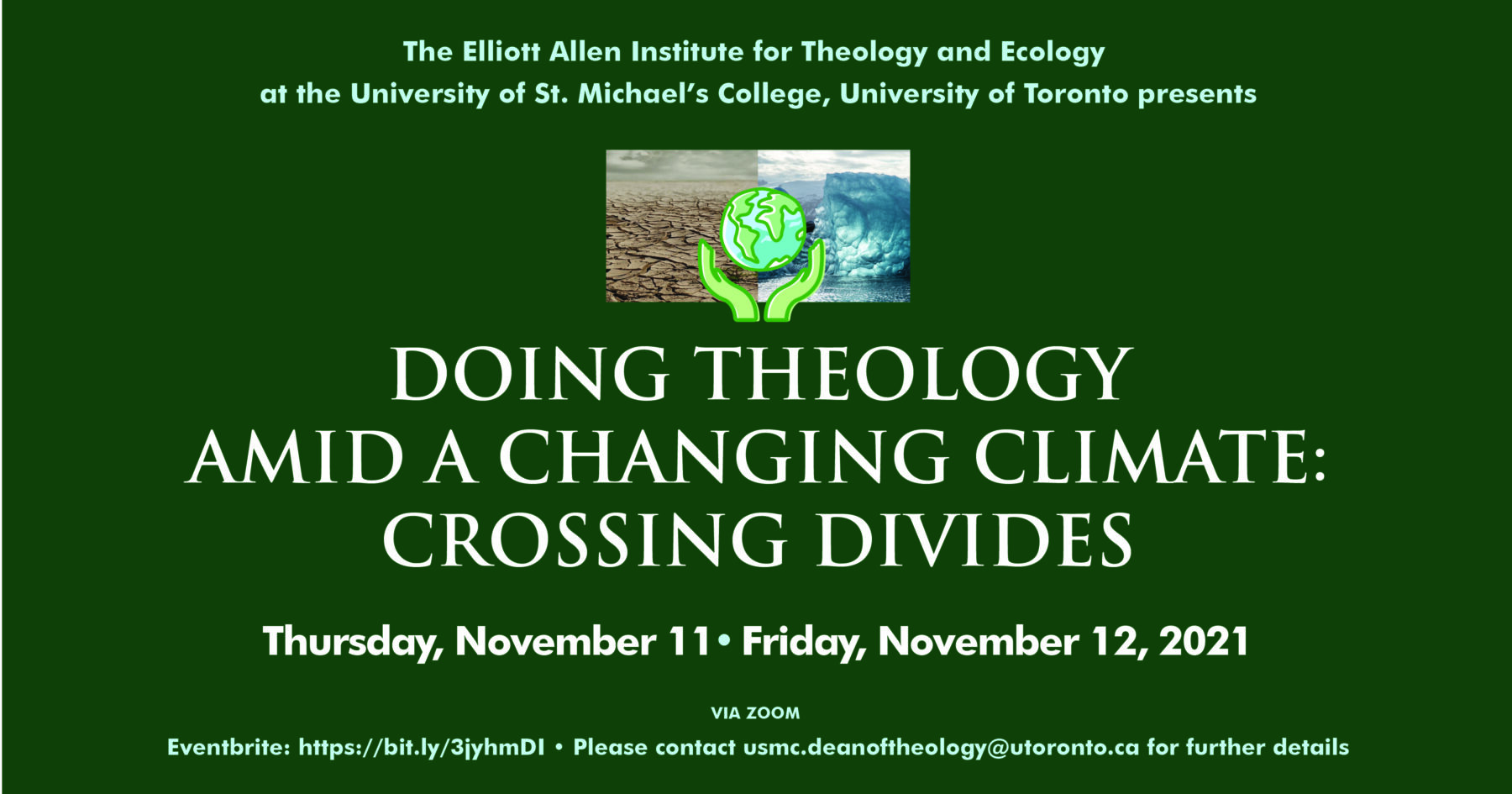Join Dr. Hilda Koster, the new holder of the Sisters of St. Joseph in Toronto Chair in Theology, at her first St. Michael’s conference November 11 and 12. Learn more about the conference from Dr. Koster’s description below.
- Thursday, November 11: 7 p.m. –8:30 p.m. ET
- Friday, November 12: 8:30 a.m. – 1:15 p.m. ET

As world leaders gather at the COP 26 UN Climate Change Conference in Glasgow to implement the Paris climate agreement, the web-conference “Doing Theology Amid a Changing Climate: Crossing Divides” explores Christian theology’s contribution to the cultural, social, and spiritual transitions needed. Together with scientists and leaders from other faith traditions, Christian churches and communities have provided common witness on climate change. Yet because climate change is not simply an issue to be addressed but signals a need for a radical change in the way we inhabit a damaged planet, theologians and scientists discuss what more is required at this crucial geo-historical moment.
The speakers and panelists will ask how we can more effectively collaborate across disciplines and align our theology with cosmology and evolutionary science. How can we overcome divisions on climate science in a post-truth world? Which revelations of the sacred will nurture our interdependence with one another and the more than human world? And, as climate change further divides climate privileged and vulnerable communities along lines of race, gender, and ethnicity, how may theologians and community leaders work together to address questions of climate justice?
This conference is hosted by the Elliott Allen Institute for Theology and Ecology at the University of St. Michael’s College (Toronto), a leading interdisciplinary Institute for scholarship and dialogue rooted in the Catholic intellectual tradition.
Thursday, November 11
7–8:30 p.m.
A keynote speech delivered the night before by Franciscan Sr. Ilia Delio of Villanova University in Pennsylvania will set the scene for panel discussions of climate justice, gender justice, climate science and climate anxiety and the Church’s response. (The Catholic Register, Oct. 23, 2021)
Keynote: “Earth’s Fragility and the Crisis of Transcendence: Why Science and Religion Must be Reconciled”
Speaker: Dr. Ilia Delio, OSF Josephine C. Connelly Endowed Chair in Theology at Villanova University
Friday, November 12
Session 1: Climate Justice and Gender Justice: Addressing Inequities and Working across Difference (8:30 – 10:00 a.m.)
To many poor and minority communities, climate change means death and destruction on an ever-larger scale. Women and gender-diverse people are especially vulnerable. Speaking from various contexts and in solidarity with communities in both the global North and South this panel of renowned Catholic women theologians discusses these inequities and injustices with a focus on resource extraction and gender justice.
Session 2: Theology and Climate Science: Addressing Indifference, Fear, and Denial (10:15 – 11:30 a.m.)
To address climate change, theologians and climate scientists need to further engage in dialogue across disciplines. This panel explores the possibilities and challenges for this collaboration. How can climate science inform Christian theology? How can they both challenge religiously motivated climate change denialism? How can theology address fear and deep-seated anxiety about the consequences of climate change? What role do climate scientists see for the wisdom and power of religion and spirituality?
Session 3: Working across Ecclesial and Colonial Divides (11:45 a.m. – 13:15 p.m.)
Despite considerable ecumenical efforts towards a common witness, Christianity remains deeply divided on ethical issues, including climate change. Theologians representing various confessional and ecclesial traditions and communities address the challenges of ecumenical collaboration. Can Catholics come together with other Christians around the vision for climate justice and sustainability that Pope Francis unfolds in the encyclical Laudato si’? Can Christians from the global South and North work together to address issues of climate injustice amidst the enduring legacy of colonialism?

